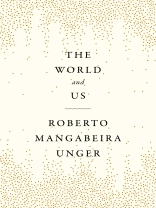In
The World and Us, Roberto Mangabeira Unger sets out to reinvent philosophy. His central theme is our transcendence – everything in our existence points beyond itself – and its relation to our finitude: everything that surrounds us, and we ourselves, are flawed and ephemeral. He asks how we can live so that we die only once, instead of dying many small deaths; how we can breathe new life and new meaning into the revolutionary movement that has aroused humanity for the last three centuries, but that is now weakened and disoriented; and how we can make sense of ourselves without claiming for human beings a miraculous exception to the general regime of nature. For Unger, philosophy must be the mind on fire, insisting on our prerogative to speak to what matters most.
From this perspective, he redefines each of the traditional parts of philosophy, from ontology and epistemology to ethics and politics. He turns moral philosophy into an exploration of the contest between the two most powerful contemporary moral visions: an ethic of self-fashioning and non-conformity, and an ethic of human connection and responsibility. And he turns political philosophy into a program of deep freedom, showing how to democratize the market economy, energize democratic politics, and give the individual worker and citizen the means to flourish amid permanent innovation.
عن المؤلف
Roberto Mangabeira Unger is one of the leading philosophers and political thinkers in the world today. Verso has published much of his writing. The Knowledge Economy applies to the analysis of our economic present and future a way of thinking prefigured in his earlier book, Free Trade Reimagined: The World Division of Labor and the Method of Economics, as well as in his central work in social theory, False Necessity.












